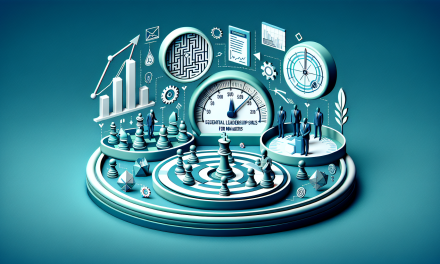Table of Contents
- The Essence of High Performance Leadership
- Key Attributes of High Performance Leaders
- Elevating Leadership Skills
- Navigating Challenges in Leadership
- Strategic Planning for Leaders
- Goal Setting and Decision Making
- Crisis Management in Leadership
- FAQ
- Conclusion
The Essence of High Performance Leadership
In today’s fast-paced and constantly evolving business landscape, the significance of high performance leadership cannot be understated. Leaders who aspire to guide their teams effectively must embrace methods that enhance their abilities and amplify their impact. This journey is about more than just personal growth; it encompasses inspiring others, fostering a positive workplace atmosphere, and achieving outstanding organizational outcomes.
Why Leadership Matters
Effective leadership serves as the backbone of any successful organization. Leaders are the ones who set the vision and align team efforts towards common goals. They cultivate a culture of accountability, empower individuals to reach their potential, and drive innovation. Essentially, great leadership transforms visions into realities.
Key Attributes of High Performance Leaders
So, what distinguishes high performance leaders from the rest? The answer lies in several key attributes that shape their leadership style and enhance their effectiveness.
Visionary Thinking
High performance leaders possess a clear vision. They see beyond the present and anticipate future trends. By embracing visionary thinking, leaders encourage creativity and innovation among their team members.
Emotional Intelligence
Another critical attribute is emotional intelligence. Leaders equipped with high emotional intelligence understand their emotions and those of others. This understanding fosters better communication, builds trust, and enables leaders to navigate interpersonal dynamics effectively.
Adaptability
In times of change, adaptability becomes a leader’s best asset. Those who embrace flexibility can pivot when necessary and encourage their teams to do the same. This adaptability ensures sustained performance regardless of external conditions.
Elevating Leadership Skills
Continuous improvement forms the foundation of effective leadership. To elevate your leadership skills, consider focusing on the following areas.
Effective Communication
Communication stands as a cornerstone of leadership. High performance leaders must cultivate the ability to communicate clearly, listen actively, and provide constructive feedback. Strong communication creates an environment where team members feel appreciated and understood.
Cultivating Team Collaboration
Great leaders foster a sense of collaboration among team members. By encouraging teamwork and establishing a shared sense of purpose, leaders unlock the full potential of their teams. They empower individuals to contribute their unique talents to achieve common objectives.
Navigating Challenges in Leadership
Leadership comes with its fair share of challenges. However, high performance leaders not only face these challenges head-on but also learn and grow from them.
Crisis Management
One critical challenge leaders must master is crisis management. Learn how to approach crises with confidence and grace through Mastering Crisis Management and Leadership Skills. Understanding how to lead during turbulent times helps maintain team morale and ensures clarity of purpose.
Handling Difficult Conversations
Another challenge involves having difficult conversations, whether addressing performance issues or navigating conflict. Great leaders approach these conversations with empathy, fostering an environment where difficult issues can be discussed openly and honestly.
Strategic Planning for Leaders
Strategic planning is essential for effective leadership. It requires foresight, critical thinking, and the ability to set clear objectives.
Essential Insights for Strategic Success
To delve deeper into strategic insights, check out Mastering Strategic Planning: Essential Insights, which provides valuable information about developing a robust strategic plan.
Goal Setting and Decision Making
Setting clear, attainable goals paves the way for success. High performance leaders understand the importance of aligning individual goals with organizational objectives.
Effective Goal Setting Techniques
To enhance your goal-setting skills, explore Mastering Goal Setting and Decision Making Skills. This will significantly improve your ability to create actionable and measurable objectives.
Crisis Management in Leadership
In times of uncertainty, effective leadership shines brightest. Great leaders implement strategies to manage crises effectively, ensuring organizational resilience.
Building Resilience
To foster resilience within teams, leaders should promote open communication and a culture of support. Furthermore, resilience training empowers individuals to bounce back from setbacks with renewed energy.
Frequently Asked Questions
What are the key skills for high performance leadership?
The key skills include emotional intelligence, effective communication, adaptability, and strategic thinking. These skills collectively contribute to a leader’s ability to inspire and guide their team.
How can I improve my leadership skills?
Improving leadership skills involves ongoing self-assessment, seeking feedback, and continuously investing in personal and professional development. Workshops, reading, and mentorship can significantly enhance your capabilities.
Conclusion
In summary, mastering high performance leadership is a journey that requires commitment, resilience, and continuous improvement. By embracing the principles outlined above, leaders can foster environments where creativity, collaboration, and exceptional results flourish. Remember, the ultimate goal is not just to lead but to inspire others to reach their full potential. For those looking to deepen their understanding, consider exploring the High Performance Leadership: Advanced Skills Training Course to equip yourself with the tools necessary for impactful leadership.
In a world of constant change, being a high performance leader ensures you and your team are prepared to meet challenges head-on, resonate with your mission, and achieve excellence together.





